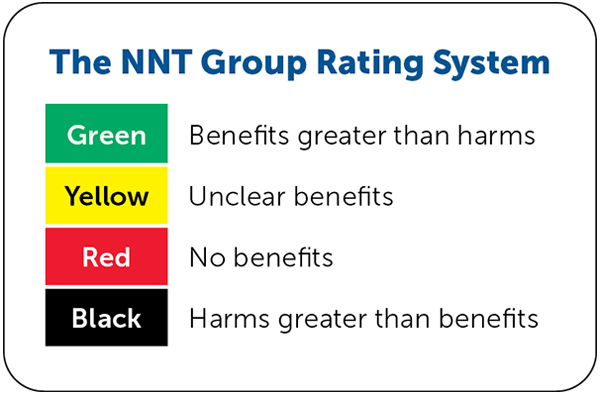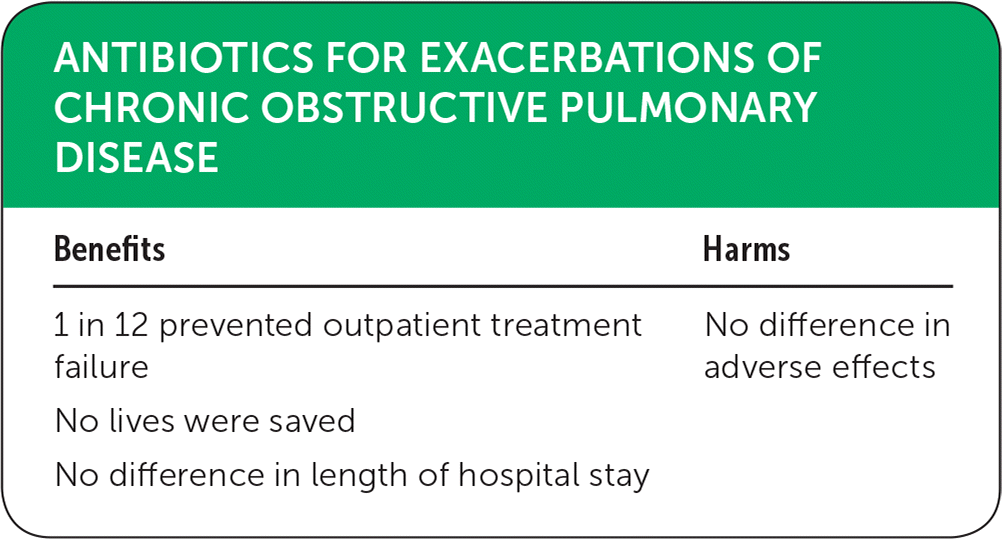
Am Fam Physician. 2020;101(3):online
Author disclosure: No relevant financial affiliations.


| Benefits | Harms |
|---|---|
| 1 in 12 prevented outpatient treatment failure | No difference in adverse effects |
| No lives were saved | |
| No difference in length of hospital stay |
Details for This Review
Study Population: Patients older than 40 years with mild to very severe exacerbations of chronic obstructive pulmonary disease (COPD)
Efficacy End Points: Treatment failure measured between seven days and one month, length of hospital stay, and mortality
Harm End Points: Diarrhea
Narrative: Prescription of antibiotics for treatment of COPD exacerbations is controversial because of the variety of etiologies that induce a flare-up, including viral, bacterial, and environmental causes.1 Approximately one-half of exacerbations are thought to be bacterial in origin.2 Antibiotics continue to be widely prescribed.3 Adverse effects are often minor, and benefits may appear to outweigh harms. However, the most important argument against antibiotic use is antibiotic overuse and the emergence of multidrug-resistant bacteria.4
This Cochrane review included 19 randomized controlled trials with 2,663 patients.5 Eleven trials evaluated outpatients, seven trials evaluated inpatients, and one trial evaluated patients in the intensive care unit (ICU). In the outpatient setting, low-quality evidence showed that antibiotics statistically and significantly reduced the risk of treatment failure with a number needed to treat (NNT) of 12 (95% CI, 0.53 to 0.90). When restricted to the seven trials that included currently used antibiotics, low-quality evidence suggested a similar effect with an NNT of 12 (95% CI, 0.56 to 0.94). There was no mortality benefit.
In the general inpatient setting, antibiotics did not have a statistically significant effect on preventing treatment failure, decreasing the length of stay, or preventing mortality. This was also true when restricted to the four studies that involved currently used antibiotics.5
In the ICU setting, there was a statistically significant effect evaluating one trial with moderate-quality evidence (relative risk = 0.19; 95% CI, 0.08 to 0.45). A statistically significant outcome was observed for decreased length of hospital stay among patients in the ICU with a mean difference of 9.60 days (95% CI, −12.84 to −6.36; low-quality evidence). In terms of all-cause mortality, low-quality evidence showed an NNT of 6 (95% CI, 0.06 to 0.72).5
No differences were noted in the occurrence of adverse effects such as diarrhea.
Caveats: The overall quality of the 19 studies was low to moderate, and studies were most often downgraded for imprecision and evidence heterogeneity. There was clinically significant evidence that antibiotics reduced treatment failure in the outpatient (low-quality evidence) and ICU (moderate-quality evidence) settings. In the inpatient setting, there was moderate-quality evidence with no statistical significance for antibiotics. This showed no difference between antibiotics and placebo in treatment failure, length of hospital stay, or mortality. In the ICU setting, there was moderate-quality evidence for a statistically significant effect on mortality and low-quality evidence on length of hospital stay. Although there was statistical significance in the ICU setting, it involved only one small trial with 93 people.
The clinical severity of the COPD exacerbations across the studies was difficult to classify. Trials did not use uniform definitions for severity of exacerbation, and definitions of COPD have changed with time. Bias was also introduced because treatment failure was defined differently by the trials. Other influencing factors, including concurrent medication use (i.e., corticosteroids, bronchodilators), comorbidities, severity of COPD at baseline, and season, could not be assessed because details were reported inconsistently across trials. Additionally, the issue of antibiotic overuse and emerging multidrug-resistant bacteria remains an open concern that was not directly addressed by this review.
Copyright © 2020 MD Aware, LLC (theNNT.com). Used with permission.
This series is coordinated by Dean A. Seehusen, MD, MPH, AFP Assistant Medical Editor, and Daniel Runde, MD, from the NNT Group.
A collection of Medicine by the Numbers published in AFP is available at https://www.aafp.org/afp/mbtn.
